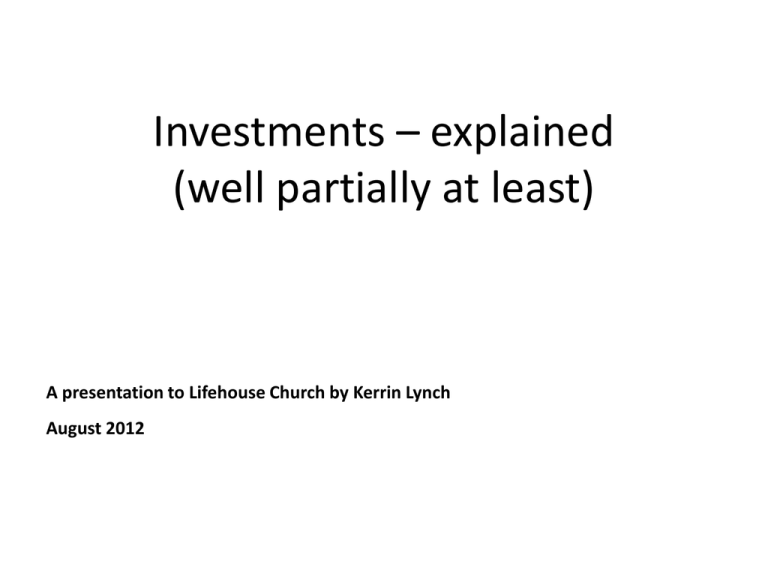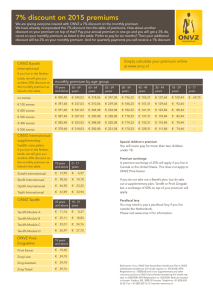Investments * explained (well partially at least)
advertisement

Investments – explained (well partially at least) A presentation to Lifehouse Church by Kerrin Lynch August 2012 Agenda Why do we invest Considerations in investing Investment premia – a different way of thinking about investments Investment types „An investor who knows all the answers, didn‘t really understand the questions to begin with.“ - Unknown Why do we invest? • As a consumer, we have the choice to spend now or save to spend at a later stage. • Live in a consumer culture (spend now, pay later!). • Save for various reasons: • • • • • Holidays Cars / other purchases Retirement – this is important! Unforeseen expenditure To leave a financial legacy to our children / grandchildren • But which is the appropriate vehicle to save in? Why do we invest? • Choose the most risky / least risky investment from the following: • • • • • Shares on the stock market A Government-issued bond Bank account Your house Your mate’s start-up IT company • The real question is: How do you define risk? • Decrease in value of your investment? • Decrease in value of your investment ? • Losing all your money? • Most important concept in investing: Why do we invest? » Risk •Vs. Return Considerations in investing • What should we take into account when we invest? • Reward – expected return from the investment • Risk – defined differently – security / probability of low or negative returns • Liabilities to be met – (A = O + L) • Term of the investment • Expenses associated with investing • Taxation regime – – income tax; and – capital gains tax • Diversification of investments (local / international / sector / companies / banks) Investment premia • Consider investments differently. In making a particular investment, what compensation (premium) am I trying to get out of the investment? • Allows you to make comparisons of different investment types to see if the compensation is worthwhile. • Premium examples • • • • • • Term Premium / Illiquidity Premium Credit Premium Inflation Risk Premium Equity Risk Premium Rand Premium Social Premium Investment Types • First some background information – Let us consider the financial structure of a typical company • Ranked from highest to lowest risk • Investors demand higher return from higher risk investment Ordinary Shares (Public or Private) 35% Preferential Shares 5% Mezzanine Loan 10% Junior Unsecured Loan 20% Senior Secured Loan 30% Investment Types • Financial products / investment opportunities available in many forms • • • • • • • • • • • Bonds (issued by Companies / Governments / Banks) Equity Property Cash Unit Trusts Retirement Annuities Property Your mortgage Derivatives - Options / Swaps / Futures Art / Gold Coins Others? • Let’s look at a few in terms of their premia / risks / rewards / other considerations Investment Types • Property • Rewards – Capital Growth / rental income • Risks – Lack of diversification / Land grabs • Expenses – Insurances / Costs of buying & selling / Maintenance • Taxation – CGT / Income tax • Premia – Illiquidity / Term Investment Types • Equity • Rewards – Capital Growth / dividend income • Risks – Market risks / Company mis-management • Expenses – Unit trust costs / Satrix fees / Broker costs • Taxation – CGT / dividend tax • Premia – Equity risk Investment Types • Gold Coin • Rewards – Capital Growth • Risks – Gold price / buyer demand • Expenses – Selling costs • Taxation – Capital Gains Tax? • Premia – Term premium / Gold Price premium Kerrin Lynch B.Sc. F.F.A. F.A.S.S.A. 1st floor, 44 Melrose Boulevard, Melrose Arch, 2196 Telephone 011 912 9134 Kerrin.lynch@towerswatson.com











